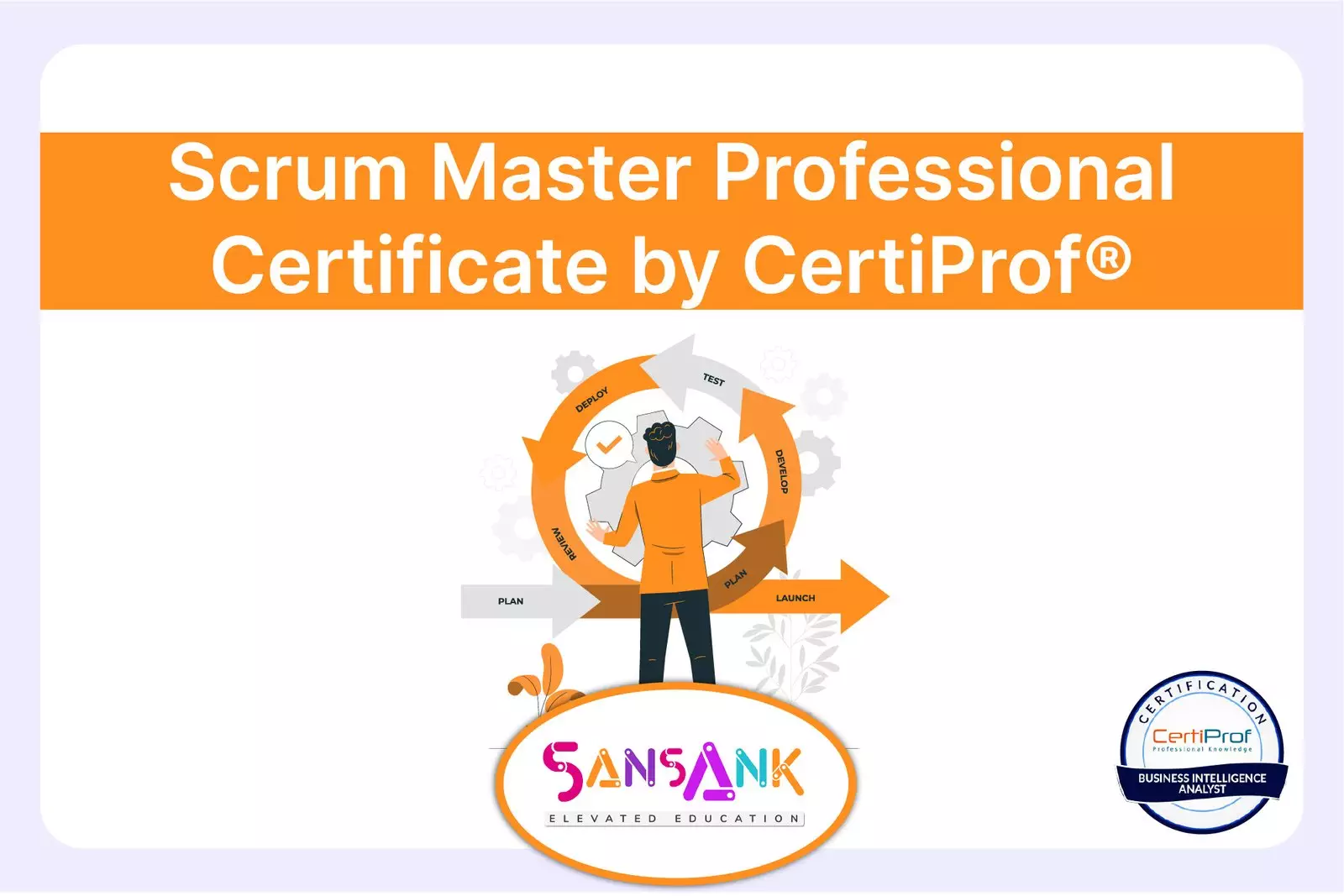Scrum Master Professional Certificate by CertiProf®
About This Course
SansAnk Academy offers a comprehensive Scrum Master Professional Certificate course that equips participants with comprehensive knowledge and practical skills to become adept Scrum Masters, enabling them to effectively guide and support agile teams in delivering successful projects through the implementation of Scrum principles and practices.
What You'll Learn
The Scrum Master Professional Certificate course provides a comprehensive introduction to Agile and Scrum, covering essential topics such as Scrum practices, planning, events, and monitoring projects, while also delving into advanced Scrum concepts, equipping participants with the skills and knowledge necessary to excel in the pivotal role of a Scrum Master..
Course Details
- Price: 20,000/-
- Duration: 2 Weeks
- Batch Size: 1-5 Candidates
Certification Exam
- Format: Multiple choice
- Questions: 40
- Language: English/Spanish/German/Portuguese
- Pass Score: 32/40 or 80%
- Duration: 60 minutes
- Open book: No
- Delivery: This examination is available Online
- Supervised: It will be at the Partner’s discretion
Course Benefits
- Certiprof Certificates
- Life-time notes access
- Training recording
- BA community access
- Free knowledge sessions
Eligibility
This certification is appropriate for anyone who is interested in becoming a Scrum Master
Curriculum
In this module, we'll explore the concept of Agile and its significance in today's business landscape. We'll delve into the Cynefin Framework, which helps us understand problem-solving in complex environments. The Agile Manifesto and its pillars will be discussed, along with the principles that underpin it. Additionally, we'll explore the Declaration of Interdependence and the six values associated with it. The module will shed light on what Agile is, how to perceive agility, and its relevance in achieving Business Agility. A comparison with traditional project management approaches will highlight the advantages of Agile methodologies. We'll also define Scrum, examining both its historical and current definitions and explore Scrum patterns for effective implementation.
Scrum theory is the foundation of the Scrum framework, emphasizing key principles like empiricism and empirical process control, which stress the importance of learning from experience. Lean Thinking, guided by five core principles, is incorporated to eliminate waste and enhance efficiency. Scrum operates iteratively, with three pillars of transparency, inspection, and adaptation ensuring effective project management. These principles collectively foster a flexible, value-driven, and continuously improving approach to complex project management.
Scrum values are a set of guiding principles that underpin the Scrum framework and promote collaboration, adaptability, and success in team-based projects. These values include Commitment, Focus, Openness, Respect, and Courage. They serve as a shared compass for Scrum teams, fostering a positive work environment and helping teams deliver high-quality products efficiently.
The Scrum Team comprises several key elements, including developers, a Product Owner, a Scrum Master, and stakeholders. This team operates with agile principles and values, focusing on self-management rather than self-organization, and plays a critical role in product development by combining diverse skills and expertise.
Scrum Events are essential ceremonies within the Scrum framework that help teams plan, collaborate, inspect, and adapt. These events include The Sprint, Sprint Planning, Sprint Backlog, Daily Scrum, Sprint Review, and Sprint Retrospective. Each event serves a specific purpose in promoting transparency, communication, and continuous improvement within the Scrum Team.
Scrum Artifacts are key documents and work items that enable transparency and guide the work within a Scrum framework. These artifacts include the Product Backlog, which outlines the product objectives, the Sprint Backlog, which commits to achieving a Sprint Goal, and the Increment, representing the potentially shippable product increment. The Definition of Done is a commitment that ensures the product meets quality standards. Agile practices are incorporated to optimize these artifacts and drive value delivery.
The Agile Glossary provides a concise reference to essential terms and concepts in the Agile methodology. It includes explanations and insights into the advantages of time-boxing, key concepts such as INVEST and Level of Detail, the formation of User Stories and Tasks, techniques like Planning Poker Estimates, and important Agile practices like Kanban, MVP (Minimum Viable Product), Velocity, and Scrum of Scrums. Additionally, it touches upon the SMPC® Exam and badges as indicators of Agile proficiency.

Have Any Question?
“Unlock Your Potential Today! Connect with Us and Take the First Step towards a Brighter Future!”
- +91-62651-60006
- teachme@sansank.com
